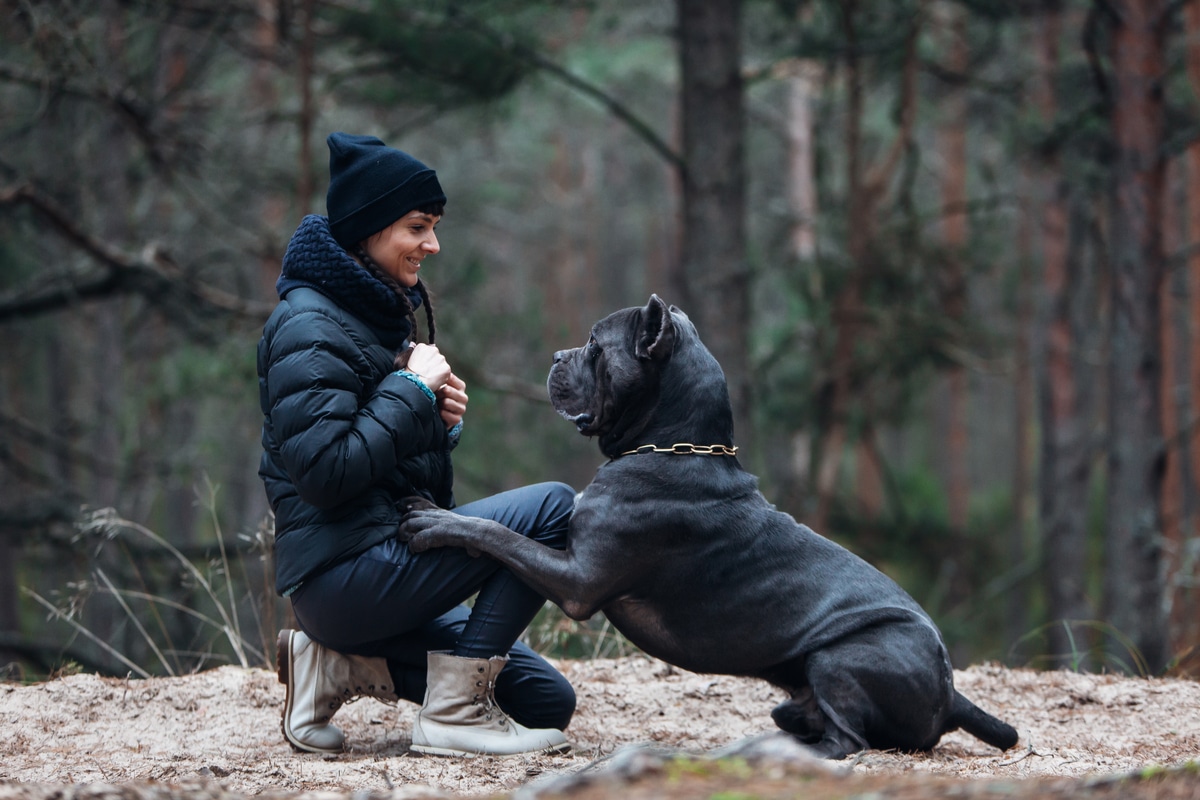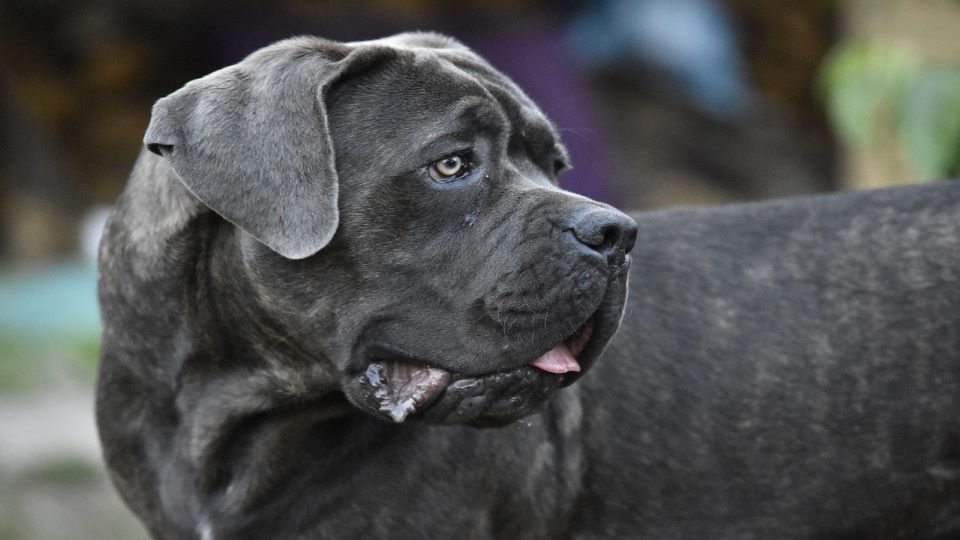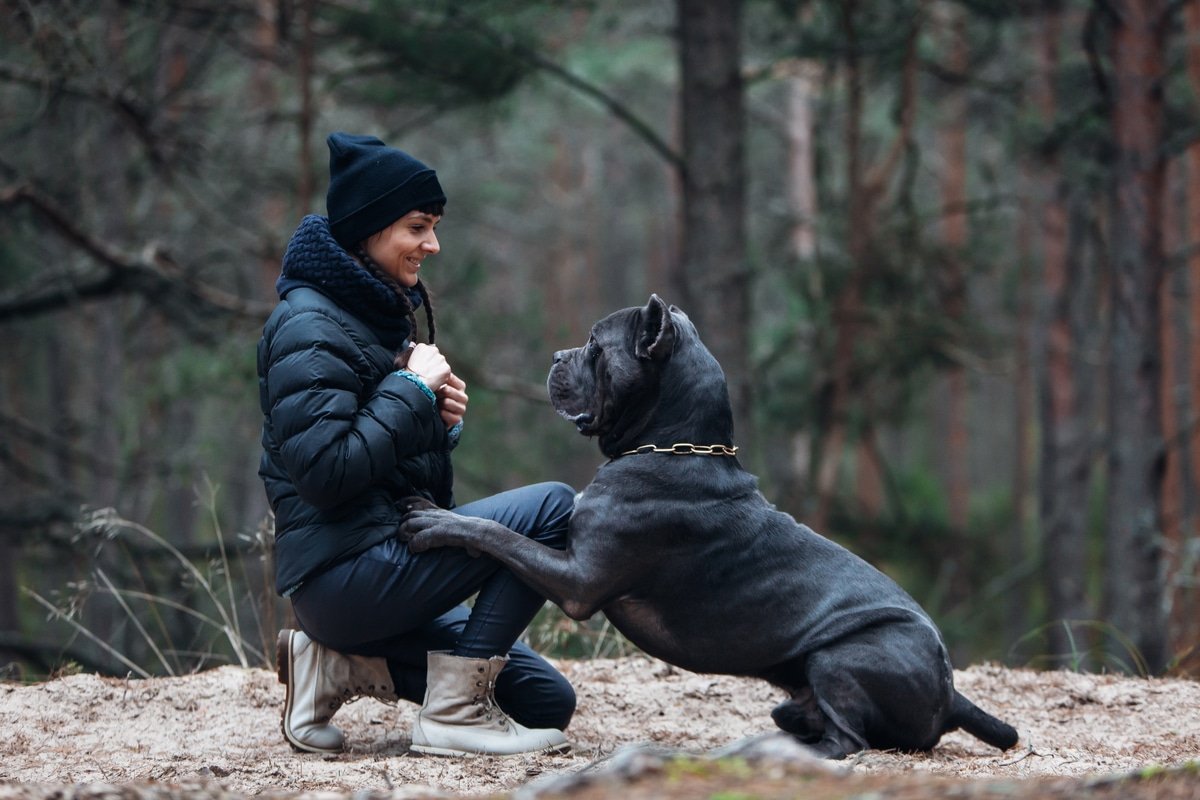Are you curious about how large a Cane Corso can grow? Well, prepare to be amazed! These powerful dogs can reach some impressive sizes. From their robust build to their muscular physique, the Cane Corso is truly a breed that commands attention.
The Cane Corso is a breed with a rich history. Originating in Italy, they were primarily used as working dogs for tasks such as hunting, guarding, and herding. Today, they are known for their loyalty, intelligence, and protective nature. When it comes to their size, male Cane Corsos typically stand between 24 to 27 inches tall at the shoulder and can weigh anywhere from 99 to 110 pounds. Females tend to be slightly smaller, standing around 23 to 26 inches tall and weighing between 88 to 99 pounds. With their impressive size and commanding presence, it’s no wonder that Cane Corsos are often sought-after companions and guardians.
The Cane Corso is a large and powerful breed, known for its muscular build and imposing presence. On average, a male Cane Corso can reach a height of 24-27.5 inches at the shoulder and weigh between 100-110 pounds. Females are slightly smaller, measuring around 23.5-26 inches tall and weighing between 90-100 pounds. Keep in mind that individual dogs may vary in size, so it’s always best to consult with a reputable breeder or veterinarian for specific information about a particular Cane Corso.

How Large Does a Cane Corso Get?
Cane Corso is a large and powerful breed of dog that originated in Italy. If you’re considering getting a Cane Corso as a pet, one question you might have is how large they can get. In this article, we will explore the average size and weight of a Cane Corso, as well as factors that can influence their growth.
Average Size and Weight
The Cane Corso is considered a large breed, with males typically being larger and heavier than females. On average, male Cane Corsos can reach a height of 24 to 27.5 inches (61 to 70 cm) at the shoulder, and weigh between 100 and 110 pounds (45 to 50 kg). Female Cane Corsos, on the other hand, generally stand about 23.5 to 26 inches (60 to 66 cm) tall and weigh around 88 to 99 pounds (40 to 45 kg).
It’s important to note that these are average measurements, and individual Cane Corsos may be slightly smaller or larger. Genetics, nutrition, exercise, and overall health can all contribute to the size and weight of a Cane Corso.
Factors that Influence Growth
Several factors can contribute to the growth and size of a Cane Corso:
- Genetics: The genetics of the Cane Corso breed play a significant role in determining their size. Dogs with larger parents are more likely to grow bigger themselves.
- Nutrition: A balanced and nutritious diet is essential for the proper growth and development of a Cane Corso. Feeding them high-quality dog food and providing appropriate portion sizes can help support their growth.
- Exercise: Regular exercise is important for a Cane Corso’s overall well-being, but it should be appropriate for their age and physical capabilities. Adequate exercise helps promote healthy growth while preventing obesity and related health issues.
- Health: The overall health and well-being of a Cane Corso can impact their growth. Regular veterinary check-ups, vaccinations, and preventive care can help ensure they are growing properly and are free from any health issues that could affect their size.
Other Considerations
It’s important to remember that individual Cane Corsos may reach their full adult size at different rates. Some may continue to grow until they reach around 2 years of age, while others may stop growing earlier. Additionally, it’s crucial to provide a Cane Corso with a loving and caring environment to support their overall development and ensure their well-being.
Training and Socialization
Proper training and socialization are crucial for a Cane Corso regardless of their size. Starting early and using positive reinforcement techniques can help them become well-behaved and balanced dogs. Socializing your Cane Corso with other animals and people from a young age will also contribute to their overall development and ensure they grow up to be friendly and well-adjusted pets.
Care and Exercise
Cane Corsos require regular exercise to keep them physically and mentally stimulated. With their size and strength, they benefit from daily walks, playtime, and activities that challenge their mind. Providing them with a secure and spacious environment to move around in is also essential.
| Male Cane Corso Height | 24 to 27.5 inches (61 to 70 cm) |
| Male Cane Corso Weight | 100 to 110 pounds (45 to 50 kg) |
| Female Cane Corso Height | 23.5 to 26 inches (60 to 66 cm) |
| Female Cane Corso Weight | 88 to 99 pounds (40 to 45 kg) |
Are Cane Corsos Good Family Dogs?
With their loyal and protective nature, Cane Corsos can make excellent family dogs. They are known to be affectionate with their family members, including children. However, proper training and socialization from a young age are essential to ensure they interact well with children and other pets.
It’s important to note that Cane Corsos are a strong and powerful breed, so they require an experienced and responsible owner who can provide them with the necessary guidance and supervision. Early socialization, obedience training, and consistent leadership help establish boundaries and ensure that they grow up to be well-behaved and balanced members of the family.
Key Takeaways – How Large Does a Cane Corso Get?
- The Cane Corso is a large breed of dog that can grow to be quite big.
- On average, male Cane Corsos can reach a height of 25 to 27.5 inches at the shoulder and weigh between 99 and 110 pounds.
- Females are slightly smaller, typically standing 23.5 to 26 inches tall and weighing 88 to 99 pounds.
- It’s important to note that individual dogs may vary in size, and genetics, nutrition, and exercise can influence their growth.
- Proper care and a balanced diet are essential to ensure the healthy development of a Cane Corso.
Frequently Asked Questions
Cane Corsos are a popular breed known for their large and muscular build. If you’re considering getting a Cane Corso, you may have questions about how large they can grow. Here are some commonly asked questions about the size of Cane Corsos.
1. What is the average size of a Cane Corso?
The average size of a fully grown Cane Corso is around 23 to 28 inches at the shoulder. Male Cane Corsos are generally larger, standing at the higher end of the height range. The weight of a Cane Corso can range from 88 to 110 pounds, with males typically weighing more than females. It’s important to note that individual Cane Corsos may vary in size depending on factors such as genetics and overall health.
Cane Corsos are considered a large breed, and their size can make them an imposing presence. However, their size should not be the only factor to consider when deciding to bring one into your family. It’s essential to understand their temperament, exercise needs, and general care requirements as well.
2. When do Cane Corsos reach their full size?
Cane Corsos typically reach their full size by the time they are around 18 to 24 months old. However, their growth rate can vary. Some Cane Corsos may reach their adult size earlier, while others may continue to fill out until they are closer to 3 years old. During this growth period, it’s important to provide them with a balanced diet and regular exercise to support their healthy development.
It’s worth noting that while a Cane Corso may have reached their full size, they may continue to gain muscle mass and fill out as they mature. Proper nutrition, exercise, and regular vet check-ups are crucial during this stage to support their overall well-being.
3. Are Cane Corsos considered a giant breed?
Cane Corsos are not classified as a giant breed, but they are considered a large and powerful breed. Giant breeds, such as Great Danes or Saint Bernards, typically exceed the size of Cane Corsos. While Cane Corsos are substantial in size, they do not typically reach the extreme proportions of giant breeds. However, they are still a considerable and robust breed that requires proper training and socialization to ensure they are well-behaved companions.
4. What factors can influence the size of a Cane Corso?
The size of a Cane Corso can be influenced by various factors, including genetics and nutrition. The genetics of the parents play a significant role in determining the size of the puppies. If both parents are large Cane Corsos, it’s likely that the puppies will also be larger. Similarly, if one parent is smaller, the puppies may inherit their smaller size.
Nutrition is another crucial factor in the size of a Cane Corso. Providing a balanced diet that supports their growth and development is essential. Overfeeding or underfeeding can impact their size and overall health. Working with a veterinarian to create a proper feeding plan is important to ensure your Cane Corso reaches their optimal size and maintains a healthy weight.
5. How can I ensure my Cane Corso grows to a healthy size?
To ensure your Cane Corso grows to a healthy size, it’s essential to focus on their overall well-being. Here are some tips:
1. Provide a balanced diet: Feed your Cane Corso a high-quality diet that meets their nutritional needs. Consult with a veterinarian to determine the appropriate amount and type of food for your dog.
2. Regular exercise: Cane Corsos are an active breed that requires regular exercise to maintain their muscle tone and overall health. Provide them with daily physical activity, such as walks, playtime, and mental stimulation.
3. Veterinary care: Schedule regular check-ups with a veterinarian to monitor your Cane Corso’s growth, address any health concerns, and ensure they are up-to-date on vaccinations and preventive care.
4. Training and socialization: Proper training and socialization are essential for a well-rounded Cane Corso. Enroll them in obedience classes and expose them to various people, animals, and environments to ensure they grow up to be confident and well-behaved dogs.

The cane corso is a large breed of dog that can grow to be quite big. On average, adult cane corsos can reach a height of 23.5 to 27.5 inches at the shoulder and weigh between 88 to 120 pounds.
However, it’s important to note that individual dogs may vary in size, and factors such as genetics, diet, and exercise can play a role in their growth. Proper care and attention should be given to ensure their health and well-being.
